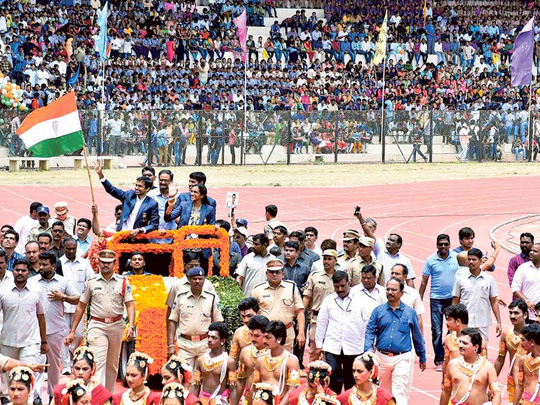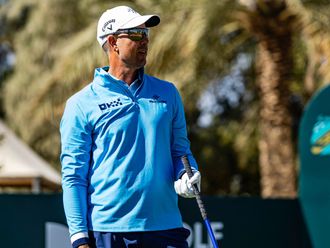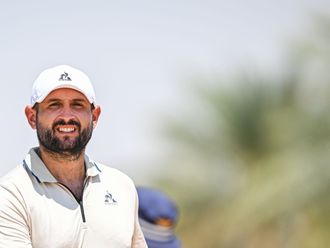
Dubai: How can a country with the world’s second largest population and seventh biggest economy finish 67th alongside Mongolia in the Olympics medal tally?
That’s the question many in India will be asking after returning from Rio 2016 with just two medals. P.V. Sindhu won silver in the women’s badminton and Sakshi Malik won bronze in the women’s 58kg freestyle wrestling.
It’s not India’s worst performance at an Olympics; they went three straight Games empty-handed from 1984 to 1992, but after winning a record best six medals at London 2012, a lot more was expected from Rio.
With 117 athletes in attendance, India sent their largest delegation and raised their Olympic budget from INR150 million (Dh8 million) to an unprecedented INR1.25 billion for this games, spending INR3 million to INR15 million per athlete. However, they still only have an all-time medal haul of 28 medals from 24 appearances, the same number of medals that most decorated Olympian Michael Phelps has from four appearances.
When other populous countries with burgeoning economies like China routinely do so well, and nations that are neither as well populated nor as well-funded like Ethiopia finish above India, it begs serious questions.
But Dr. Ronojoy Sen, a senior research fellow in South Asian Studies at the University of Singapore, who wrote ‘Nation at Play: A History of Sport in India’, defended the country’s Olympic form.
“We must remember that despite India’s rapid economic growth in recent years and great power aspirations, it still ranks a lowly 130 out of 188 countries in the Human Development Index, which puts it behind countries like El Salvador and Vietnam,” he said.
“Despite a huge population [1.2 billion] India’s effective participating population in sports is very small due to poor health, poverty and low literacy levels.”
Comparing India’s sporting record to that of China, he said was unfair, despite the similarity in population and economic growth.
Crucial connection
“Unlike China, the Soviet Union, or Japan, there was never a crucial connection made between sport and nation-building in the early years of independent India.
“It’s also difficult for democracies like India to match not only the funds invested in sport but also the authoritarian manner in which talent is spotted and groomed [in China].”
And of lesser funded and populated countries doing better than India, Sen added: “There are poorer countries that win medals like Ethiopia and Kenya but they have a winning tradition in a particular sport like long distance running, which India seems to lack.
“I don’t think there is a cultural reason for Indians not excelling in sport. There is a culture of sport in India but not a culture of winning. And the middle classes and elites who have access to sporting facilities often end up pursuing studies and careers. This is of course true of other countries.
“Things will improve as more people play sport in India, particularly the lower classes who make up the bulk of the population. But to win medals the state and private organisations have to focus on particular sports like shooting, wrestling, boxing and badminton, where India has traditionally done well.
“I think there will be a lot of discussion after the Olympics, but I don’t think Indians or anyone else should fret too much about not winning medals. It’s more important to get more people playing sport first than to get anxious about not winning.”
Irina Singh, India’s former No. 1 women’s golfer [1999 to 2008] turned sports psychologist, blamed the system not the athletes for India’s Rio shortfall.
“The Ministry of Sport has great schemes for the No. 1 in each discipline to train abroad on scholarship and improve their equipment, but in some cases the federations don’t make that known to the athlete.
“I personally had a hard task of getting money out of the federation because the authorities are seeping in red-tapism. The money was somewhere in the system but it was not worth the hassle of going around and getting approvals signed by 20 different people.
“That’s what it’s like in India, it’s not just sport, it’s everything. We have a seeping population and the system is overwhelmed, I’m not sure it’s as overwhelmed in sport, but the attitude becomes that. Unless you know someone it’s very difficult to get things done.
“I was fortunate to be from a family where I didn’t need the money, so I was still able to go abroad to train and compete. But how many of our athletes can do it without help? Cricket gets all the sponsors and other sports are only in the limelight for the fortnight of an Olympics, after that they are forgotten again.”
Last-minute preparation
Singh also criticised last minute preparation, the lack of exposure to overseas competition and ministerial cronies travelling to the Olympics at the expense of qualified support staff, particularly psychologists.
“I don’t think athletes feel they have anything less in ability than anyone else, it’s just an uphill struggle. Whereas in other countries the system is designed to support you, in India you have to fight against it.
“For me it was my mother and father who supported me, whereas the national body sent me to one event a year. How are you supposed to get exposure from one event a year? It was only until my parents sent me to the other five or six events that I got comfortable with competing abroad.
“Indian athletes are not trained in mental skills to deal with the doubt and fear that they are bound to feel. They need to work with psychologists and get much more exposure abroad so the Olympics doesn’t feel like such a big deal.”Singh also added that the old adage that Indian parents prefer their children to become doctors, lawyers or engineers, was becoming cliché.
“I get a lot of parents who would do anything to see their child make it as an athlete. We already have thousands of doctors and lawyers, and they’ve seen how sport can lift you up the classes. The mindset is changing, some golfers aren’t even going to college."
“However, there’s still a bit of cynicism as to whether the child will make it, just because the system is not there to support them. And that dissuades them from pushing them down that route.”
The work of independent non-profit organisations like Olympic Gold Quest (OGC) and Anglian Medal Hunt, run by former athletes — not civil servants — who actually understand what athletes need, was pivotal to bridge the above disconnect, she added.
Former badminton player Prakash Padukone, who is co-founder of Olympic Gold Quest, said change had already been made.
“There are a lot of talented athletes who get a lot of support from various quarters now,” he said.
“I’m not saying it’s enough, but the beginning has been made. It’s much easier now and there is some sort of direction. It only needs growth.
“In our country things go very slowly. But in terms of funding, for the first time in the history of Indian sports, there can be absolutely no complaints.”
In that sense, Padukone suggested the poor showing at Rio was down to the mentality of the athletes.
“All of us need to be disappointed as we were expecting so much more from Brazil, especially after winning six medals in London.
“I think expectations were probably too high and most of them have been unable to handle the pressure. I think it has more to do with the mind. It is not so much the preparation. They have simply not been able to perform to their true potential.
“Maybe we need more psychology. Events like shooting and archery are mind sports and I think we need psychologists to help our athletes concentrate and learn how to cope with pressure.”
— With inputs from Alaric Gomes, Senior Reporter










